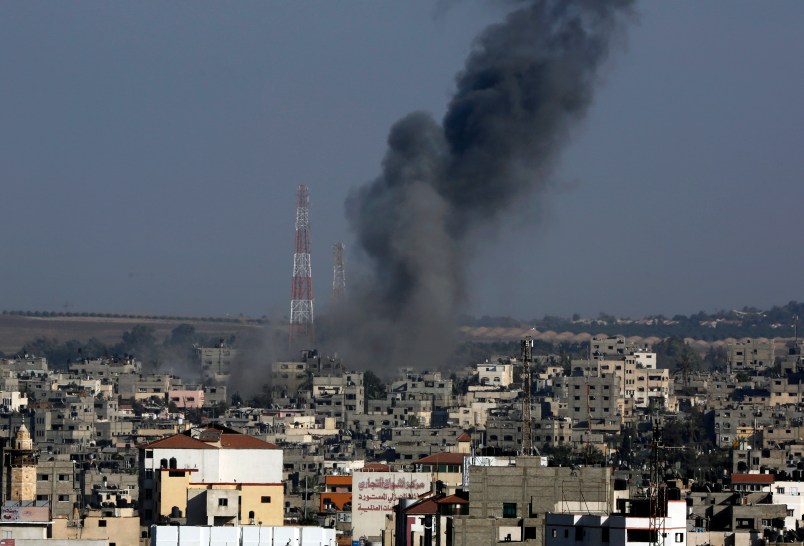Updated: August 20, 2014, 2:02 PM EDT
GAZA CITY, Gaza Strip (AP) — Palestinian militants launched dozens of rockets and Israel responded with airstrikes Wednesday after Egyptian efforts to mediate a lasting truce in the monthlong Gaza war collapsed in a hail of fire a day earlier.
One of the Israeli airstrikes appeared to have targeted Mohammed Deif, the Islamic militant group’s elusive military chief, who has escaped numerous Israeli assassination attempts in the past.
But Hamas said that Israel failed to kill Deif, saying that he was not present during the strike on a Gaza house. Five people were killed, including Deif’s wife and infant son, Hamas officials said.
The fighting resumed late Tuesday when Gaza militants fired rockets at Israeli cities just hours before a temporary cease-fire was set to expire, prompting Israel to withdraw its delegation from Cairo and launch retaliatory airstrikes. Since the truce collapsed, at least 20 Palestinians have been killed and more than 120 wounded, Gaza Health Ministry official Ashraf al-Kidra said.
The Israeli military said it carried out nearly 100 airstrikes on Gaza targets, and that Palestinians had fired more than 140 rockets at Israel since the temporary truce collapsed. About 2,000 reserve soldiers who had been sent home two weeks ago were called up for duty again Wednesday, the military said.
The breakdown in talks and the resumption of violence marked a bitter ending to nearly a week of Egyptian-led diplomacy meant to end the war, which has reduced entire Gaza neighborhoods to rubble.
More than 2,000 Palestinians, most of them civilians, have been killed since the war began on July 8, according to Palestinian and U.N. officials, and tens of thousands of people have been left homeless. Sixty-four Israeli soldiers, two Israeli civilians and a guest worker from Thailand have also been killed.
Israel’s military also said it targeted two Palestinian militants after they fired rockets at Israel early Wednesday afternoon. The Palestinian Red Crescent said they were killed.
Soon afterward, a rocket fired from Gaza hit a house in southern Israel, causing damage to the home but no injuries.
In Cairo, Moussa Abu Marzouk, a senior Hamas leader, said that among those killed in the airstrike on the three-story house in Gaza City were Deif’s wife and a child. Three others in the building were also killed.
Abu Obeida, the spokesman for Hamas’ military wing, said Israel was “unable to get to our commander Deif,” saying he will “lead the army that will enter to liberate the holy al-Aqsa mosque” in Jerusalem.
In a televised statement, Abu Obeida also warned international airlines against flying into Israel starting Thursday, suggesting hostilities may continue. Earlier in the conflict, airlines suspended their flights into Israel after a rocket landed in a town near Israel’s main international airport.
Sami Abu Zuhri, a Hamas spokesman, told the group’s TV station Al-Aqsa that Deif “wasn’t even in the location when they bombed it.”
Israel has not formally commented on the strike but local media quoted an anonymous official as saying it was meant to hit Deif.
Twenty-one people were wounded in a separate airstrike that hit the building that houses Al-Aqsa TV, said al-Kidra, of the Hamas-run Gaza Health Ministry.
Air raid sirens wailed in southern Israeli cities Wednesday morning warning of incoming rockets from Gaza. There were no reports of injuries, though a piece of a rocket that was intercepted near Tel Aviv fell on a busy road on Tuesday night.
Israel’s civil defense authority meanwhile ordered the reopening of public bomb shelters within 50 miles (80 kilometers) of Gaza.
In the talks, Hamas sought an end to a crippling Israeli-Egyptian blockade imposed when it seized power in Gaza in 2007, while Israel wanted guarantees that the Islamic militant group will disarm.
In nearly a week of indirect talks, Egypt appears to have made little headway in resolving the differences. Late Monday, it secured a 24-hour cease-fire extension to allow for a last-ditch attempt to reach a deal.
On Wednesday, the Egyptian Foreign Ministry expressed “deep regret” over the breaking of the cease-fire. It said in a statement that it “continues bilateral contacts” with both sides aimed at restoring calm and securing a lasting truce that “serves the interest of the Palestinian people, especially in relation to the opening of the crossings and reconstruction.”
An Egyptian compromise proposal calls for easing the blockade, but not lifting it altogether or opening the territory’s air and seaports, as Hamas has demanded.
While the plan does not require Hamas to give up its weapons, it would give Western-backed Palestinian President Mahmoud Abbas, whose forces were ousted by Hamas in 2007, a foothold back in Gaza running border crossings and overseeing internationally-backed reconstruction.
The Gaza blockade has greatly limited the movement of Palestinians in and out of the territory of 1.8 million people, restricted the flow of goods into Gaza and blocked virtually all exports.
Israel says the blockade is needed to prevent Hamas and other militant groups from getting weapons, but critics say the measures have amounted to collective punishment.
The latest round of Gaza fighting started after Israel arrested of hundreds of Hamas members in the West Bank in the aftermath of the abduction and killing of three Israeli teenagers in June. Their deaths were followed by the slaying of a Palestinian youth in Jerusalem in what was a likely revenge attack.
___
Deitch reported from Jerusalem. Associated Press writers Mohammed Daraghmeh and Maggie Michael in Cairo contributed to this report.
Copyright 2014 The Associated Press. All rights reserved. This material may not be published, broadcast, rewritten or redistributed.







Gee! Didn’t see THAT coming…
Yeah, well, the Lord works in mysterious ways.
Hamas apparently hasn’t learned Newton’s Third Law: For every action, there is an equal and opposite reaction